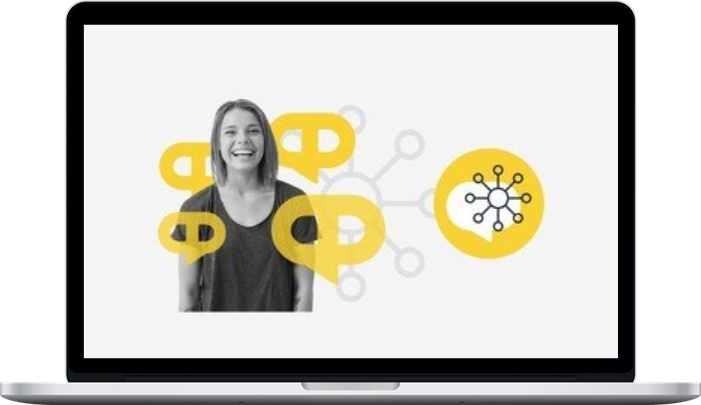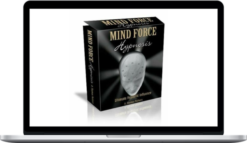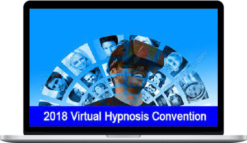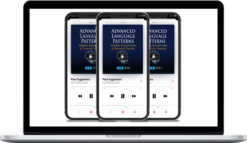Kain Ramsay – Neuro-Linguistic Programming (NLP) Practitioner Certificate
$84.99 $11.00
»Instant Delivery
Description
Kain Ramsay – Neuro-Linguistic Programming (NLP) Practitioner Certificate
Description of Neuro-Linguistic Programming (NLP) Practitioner Certificate

Neuro-Linguistic Programming (NLP) is a branch of Applied Psychology that aims to enhance people’s ability to make wise decisions and achieve their goals. NLP involves recognizing learned patterns of behavior or thinking and then finding creative new ways to make use of them or to update them.
In the field of NLP, or neuro-linguistic programming, the study is devoted to the way we communicate with ourselves inside, which affects the way we communicate with others externally. In particular, it focuses on the conscious and unconscious mental processes that influence how we interpret our everyday life, career and relationship experiences.
The philosophy of NLP states that our perceptions, beliefs, emotions, behaviors, attitudes, and communication styles are linked to the results and outcomes we experience every day. At the practitioner level of neuro-linguistic programming, you will advance from learning basic concepts to utilizing NLP in all aspects of your professional or personal life.
NLP is a way of thinking, one that is characterized by curiosity, a desire to learn, and a respect for other people. The practice involves observing how individuals behave, think, and feel, and how they produce results. NLP comes from three different disciplines, all of which are incorporated and explored throughout this NLP Practitioner training course.
Those who are interested in NLP Practitioner training usually wish to make a positive social impact rather than spend years studying classical psychology. With our NLP Practitioner program, you’ll learn a wide range of life principles you can apply in your day-to-day life to enhance productivity, improve relationships, and develop deep self-awareness.
This course will provide you with a wide range of valuable life skills, knowledge, and expertise which will allow you to understand how people communicate, grow, learn, change, and develop. NLP Practitioner training is typically of interest to training instructors, mentors, coaches, managers, and therapists who are passionate about positively inspiring others.
Neuro-Linguistic Programming is becoming widely relevant to people’s everyday lives and businesses due to its practical applications. Today more than ever, NLP concepts feature in many leadership, coaching and communication skills training. Adding NLP to your portfolio will give you access to the most powerful personal development teachings available today.
Those seeking to improve their relationship with themselves, eliminate self-doubt, and improve their interactions with others are also provided with methods for achieving personal growth. The course will also provide you with a range of innovative strategies for evaluating your attitudes, gaining personal empowerment, and fostering an attitude of responsibility.
In this course you will receive a variety of bite-sized modules that are easy to understand and apply. You will enjoy the freedom of learning at your own pace, from anywhere, with any device. This course is offered by the Academy of Modern Applied Psychology and incorporates all of the essential subjects to give you in-depth comprehension of NLP.
“Over the last 25 years, I must have attended over 15 different NLP practitioner training courses – all around the world, and with multiple different companies. This is the first course that has ever made practical sense!” – Jules B. Tullie
This training is part of a larger curriculum of professional development training resources, designed by Kain Ramsay Ltd, and hosted within the Achology community peer-learning environment. The training course is accompanied by a 30-day money back guarantee, so if you’re not happy with the format, you can get your money back – no questions asked.
What you’ll learn in Neuro-Linguistic Programming (NLP) Practitioner Certificate
What you’ll learn
- The conscious use of language – Milton & Meta model approaches.
- Know how the mind works – the processes and the programming.
- Take complete control of your thinking with the power of Anchoring.
- Become aware of how people communicate, learn, change and develop.
- How to formulate a vision for the future that is aligned with your values.
- The history, study, structure and healthy presuppositions of NLP.
- A process for setting meaningful goals and taking decisive action.
- How to develop meaningful rapport with people and earn their trust.
- A time-honoured framework for effective coaching and mentoring.
- And much, much more (please review the full course curriculum).
Course Content
Introduction Section
- Welcome to NLP Practitioner and Course Introductions
- Course Support and Frequently Asked Questions (FAQs)
- What is Neuro-Linguistic Programming (NLP)?
- Neuri-Logical Flexibility and Rigidity
- The Four Pillars of Neuro-Linguistic Programming
- Present State to Desired State
- The Three Levels of Impact
- A Framework for Improving Your Judgement
- Evaluating the Precision of Perception
- An Objective Evaluation of NLP
- Exercise: Self-Reflection Questions
- The Presuppositions of NLP (Part 1)
- The Presuppositions of NLP Part 2
- Stretching Your Neuro-Logical Pathways
- Noam Chomsky’s Cognitive Bias
- The History of Neuro-Linguistic Programming
- Bloom’s Framework for Critical Thinking
- NLP and its Applications today
Neurological Insights Into The Human Experience
- Making Distinctions and Building Wisdom
- The Developing of True Objectivity
- A Conversation about the Heart of Wisdom
- The Learning Process of Socialisation (Part 1)
- The Learning Process of Socialisation (Part 2)
- The Frame of Reference (Norms)
- Reframing Meaning with Virginia Satir
- A Guide to Expanding Cognitive Flexibility
- A Conversation about Reframing Our Meanings
- Linguistic Patterns for Reframing Meanings
- Demonstration of the Satir Reframing Matrix
- The Eysenck Model of Personality
- Fixed Vs Growth Mindset
- Self-Reflection Questions
- Stepping Out of the Comfort Zone
Self-Awareness, Growth, Clarity and Goals
- The Difference between Perception and Reality
- The Johari Window
- Erikson’s Eight Stages of Human Development
- Questions to Evaluate our Ongoing Development
- Creating Change for the Long-Term
- Drawing Meaning from our Past Experience
- 50 Questions for Finding your Passion & Purpose in Life
- The 4 Approaches to Tackling Problems
- Using Positive Outcomes in Language
- The ‘Disempowerment’ Dynamic
- The ‘Empowerment’ Dynamic
- Present State to Desired State: Further Distinctions
- A Framework for Setting Goals and Defining Vision
- Goal Setting: NLP Well-formed Outcomes
- Demonstration: Well-formed Outcomes
- Understanding Future Pacing
- Demonstration: Future Pacing
- The Lazarus Technique
- Demonstration: The Lazarus Technique
A Practical Framework for Effective NLP Coaching
- Introducing a Guide for Effective NLP Coaching
- Four Stages of the NLP Coaching Model
- Positive and Negative Motivation
- Demonstration: Attending Skills
- Gerard Egan’s Skilled Helper Model
- Demonstration: The Skilled Helper Model
- Clarifying ‘Low Level’ Motivations
- How OK is it to be Totally Honest?
- Demonstration: Truth Centred Questions
- 10 Creative Solution Focussed Questions
NLP State and the Basis of Human Responses
- The Determinants of State & NLP Communications Model
- Representational Systems for Change
- Questions to Develop Your Wise Mind
- The Two ‘Therapeutic’ Approaches
- The EQ-i Model for Emotional and Social Functioning
- Plato’s Allegory of The Cave
- NLP State: The Three Dimensions of State
- Kohlberg’s Stages of Moral Development
- The Internal State Loop
- The Internal State Loop Exercise
- A Discussion about State
- The Timeline of Human Experience
- Strategies for Self-Regulation & Management
- A Conversation about Self-Regulation
- Another Perspective on Developing Personal Excellence
- 8 Questions for Developing Wise Reasoning Skills
- 9 Self-Reflection Questions
The Wisdom of Virgina Satir, Fritz Pearls & Milton H. Erikson
- Family Dynamics with Virginia Satir
- The Main Character Attributes of a ‘Leveller’
- Virginia Satir’s Critical Ideologies
- The Key Assumptions of Fritz Perls
- The Main Ideas of Gestalt Therapy
- Humanism’s Contribution to Psychology
- Milton Erickson & The NLP Milton Model
- Milton Erickson’s Language Patterns
NLP Change Work Processes Principles
- The Essentials of Personal Change
- Expressions of Interpretative Relatability
- Prerequisites of Developing Rapport
- Demonstration: Practising Immediacy
- Demonstration: Perceptual Repositioning
- Immediating on Eye-Accessing Cues
- Demonstration: Eye-Accessing Cues
- Pacing, Leading, and Sensory Acuity
- The NLP Dissociation Technique
- How to Reposition Your Perception for Change
- Demonstration: Perceptual Repositioning
- The NLP Meta Mirror for Change
- Demonstration: The NLP Meta Mirror
- The NLP Meta Mirror: Further Distinctions
- The Submodalities of Internal Representation
- Using Submodalities in Language
- Demonstration: Using Submodalities in Language
- Using Submodalities in Coaching
- Neisser’s 5 Levels of Self-Awareness
NLP Anchoring, Learning & Conditioned Behavior
- NLP Anchoring (Representational Reimagining)
- Recalling Memory Anchors
- Where NLP Belief Anchors are Born
- The Formation of Anchors and Conditioned Behaviour
- Kain’s Top 10 Limiting Beliefs
- The Four Stages of Anchor Development
- Before NLP Anchoring: Early Behavioural Studies
- A Closer Look at Behaviourism
- The Beliefs that Keep us Anchored to Disempowerment (Part 1)
- The Beliefs that Keep us Anchored to Disempowerment (Part 2)
- A Conversation about Anchors
- How Present is Your past?
- How Present is Your Future?
NLP Communication Skills & Language Patterns
- Operation Hearts and Minds
- The Stages of Connection in Mature Relationships
- The Four Stages in Communications
- Two Simple Perspective Changing Questions
- Demonstration: Perspective Changing Questions
- The 4 Main Styles of Communication
- Unlocking the Meta Model (Part 1)
- Unlocking the Meta Model (Part 2)
- The Hierarchy of Ideas: Chunking Up and Down
- Demonstration: Chunking Up and Down
- Immediacy: The Attending Skill
- Breaking Habits with Conversation (Part 1) Demonstration
- Breaking Habits with Conversation (Part 2) Demonstration
- Demonstration Deconstruction
- Intonation Patterns with Intentionality
- The Core Communication Skills Workbook
NLP Strategies for Increasing Self-Effectiveness
- Understanding Strategy
- NLP Learning: Strategies
- An Effective Financial Strategy
- Strategy Elicitation Exercise
- Demystifying Strategy: Modelling
- Strategy Elicitation Demonstration
- The Freedom Strategy
- Public Speaking & Presentations Strategy
Unpacking Core Human Values
- Introducing the Core Values Section
- Aristotle’s 12 Essential Human Virtues (Part 1)
- Aristotle’s 12 Essential Human Virtues (Part 2)
- Abraham Maslow’s Hierarchy of Needs
- Characteristics of a Self-Actualised Person
- Understanding Core Human Values (Part 1)
- Understanding Core Human Values (Part 2)
- The Achology Core Values Workbook
End of Course Summary
- Congratulations on Completing the Course
- Course Summary & Closing Thoughts
About Kain Ramsay

Social Investor, Achologist, and Pioneer in Education Reform
In addition to being an acclaimed keynote speaker, a social media presence with a global audience, and an established social entrepreneur, Kain Ramsay is an international bestselling author and a time-served applied psychologist.
For the past 15 years, Kain has been involved in the fields of applied psychology, social entrepreneurship, coaching, mentoring, and training. Since 2007, Kain’s distinctive communication style has continued to inspire individuals, teams, audiences and organizations around the world to achieve their highest potential.
Kain began his career in the armed forces, then gained international experience in business development before becoming one of the World’s most popular instructors in life coaching. Using cutting-edge methodologies, he teaches social entrepreneurs, coaches, and executives how to realize their potential and impact the world for the better, and introduces a new, forward-thinking method for delivering education.
With his entrepreneurial mindset and ability to build communities, Kain’s innovative teaching philosophy has been adopted by social influencers around the globe, who use his practical strategies and insights to improve their lives and those of others.
Kain became an instructor for Udemy in 2014. Currently, over 650,000 learners around the world follow his training materials, making him one of the most popular instructors on Udemy in the categories of personal development, communication skills, self-awareness training, modern applied psychology, and mental health.
In 2015, Kain was one of the founders of Achology, a groundbreaking digital training platform that enables an international learning community to collaborate in their learning and competency development. Competency and integrity, being two of Kains most deeply prioritised values. Kain founded and launched Achology, a groundbreaking approach to e-learning, in 2018.
Kain has leveled the playing field by introducing contemporary psychological principles into today’s educational system, so that individuals and organisations alike, can gain greater understanding of the strategies and insights required to enhance their intrinsic value and make a greater impact in the modern world.
Kain and his wife, Karen, live in Dunfermline, the ancient capital of Scotland.
In addition to his extensive analysis of real-life experiences, Kain’s teaching methodology has inspired thousands of enthusiasts and professionals around the world to realize their full potential and begin making a positive impact.
More courses from the same author: Kain Ramsay
Proof:
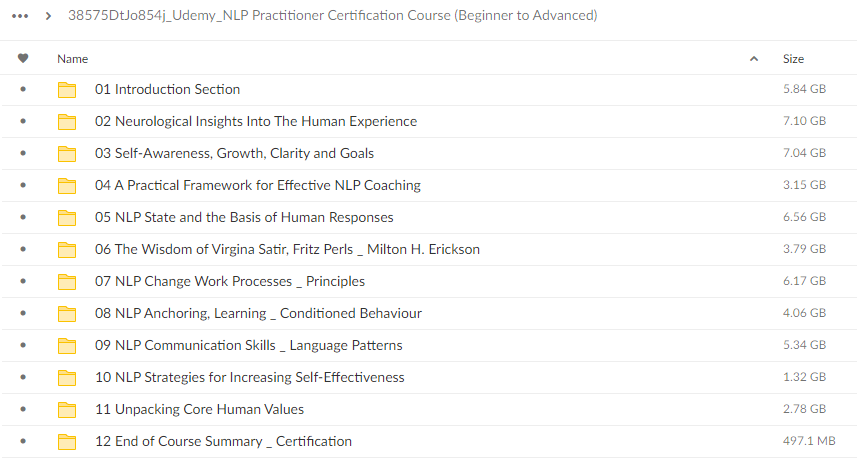
Delivery Policy
When will I receive my course?
You will receive a link to download your course immediately or within 1 to 21 days. It depends on the product you buy, so please read the short description of the product carefully before making a purchase.
How is my course delivered?
We share courses through Google Drive, so once your order is complete, you'll receive an invitation to view the course in your email.
To avoid any delay in delivery, please provide a Google mail and enter your email address correctly in the Checkout Page.
In case you submit a wrong email address, please contact us to resend the course to the correct email.
How do I check status of my order?
Please log in to HealingCourse account then go to Order Page. You will find all your orders includes number, date, status and total price.
If the status is Processing: Your course is being uploaded. Please be patient and wait for us to complete your order. If your order has multiple courses and one of them has not been updated with the download link, the status of the order is also Processing.
If the status is Completed: Your course is ready for immediate download. Click "VIEW" to view details and download the course.
Where can I find my course?
Once your order is complete, a link to download the course will automatically be sent to your email.
You can also get the download link by logging into your HealingCourse account then going to Downloads Page.
Related products
Total sold: 16


